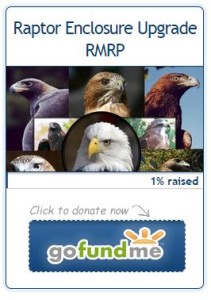We need Your Help Now to protect our education raptors from the deadly Avian Influenza Virus.
New, safe enclosures and upgrades in biosecurity for their well-being
is critical.
Here are the details:
A new strain of Avian Influenza has arrived in North America via migrating waterfowl in late 2014, and has quickly spread along migratory bird corridors of the Pacific, Central, and Mississippi flyways. It is spread by waterfowl, which don’t get sick from the virus. Most infections have occurred in U.S. domestic poultry, which exhibit 100% mortality. It is also considered to be fatal to raptors.
Several of the Rocky Mountain Raptor Program Educational Raptors have been housed for decades at the Environmental Learning Center (ELC), a beautiful nature center along the Poudre River. While the ELC is an ideal location for viewing raptors, we are concerned that the birds that live there are at risk because of the proximity to the Poudre River and several wetlands, which are frequented by waterfowl. To better protect our education birds, the Rocky Mountain Raptor Program has relocated the raptors that normally live at the ELC to our main facility.
We typically house 8 birds at the ELC: 3 golden eagles, a bald eagle, 3 red-tailed hawks, and a Swainson’s hawk. Two of the golden eagles were moved to our main facility earlier this spring so that we can better monitor health issues. The remaining birds were moved in late April to our main facility. To accommodate these birds, we are renovating our enclosures to make room. We are also enhancing our biosecurity of the facility, adding measures such as footbaths and gravel pathways that help prevent the spread of disease by footgear.
But all of this costs money: $16,000. And we need your help NOW to help pay for materials such as lumber, supplies, and disinfectant so we can keep our birds safe.
Please donate today – every gift, no matter the size, will help save lives!!!
970-484-7756
2519 S. Shields St. #115 Fort Collins, CO 80526
The Rocky Mountain Raptor Program inspires the protection and appreciation of raptors and the spaces where they live through excellence in rehabilitation, education and research.

